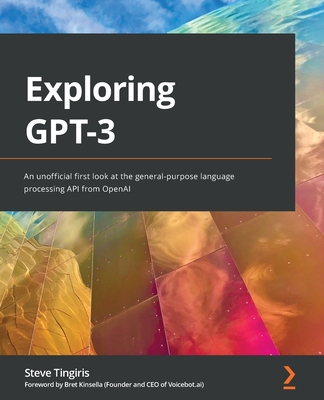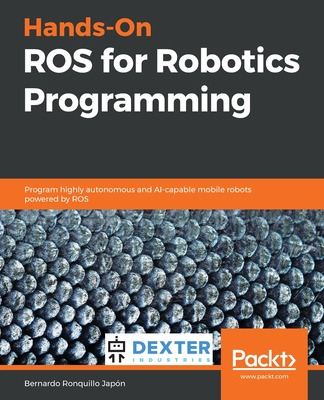Intelligent Autonomous Drones with Cognitive Deep Learning: Build Ai-Enabled Land Drones with the Raspberry Pi 4
暫譯: 智能自主無人機與認知深度學習:使用 Raspberry Pi 4 建構 AI 驅動的地面無人機
Blubaugh, David Allen, Sears, Benjamin, Harbour, Steven D.
- 出版商: Apress
- 出版日期: 2022-11-01
- 售價: $2,430
- 貴賓價: 9.5 折 $2,309
- 語言: 英文
- 頁數: 580
- 裝訂: Quality Paper - also called trade paper
- ISBN: 1484268024
- ISBN-13: 9781484268025
-
相關分類:
無人機
-
相關翻譯:
基於認知深度學習的智能自主無人系統設計與開發 (簡中版)
立即出貨 (庫存=1)
買這商品的人也買了...
-
 Graphics and Visualization: Principles & Algorithms
Graphics and Visualization: Principles & Algorithms$4,560$4,332 -
 Polygon Mesh Processing (Hardcover)
Polygon Mesh Processing (Hardcover)$2,450$2,328 -
 3D Engine Design for Virtual Globes (Hardcover)
3D Engine Design for Virtual Globes (Hardcover)$5,250$4,988 -
 Algorithmic Foundation of Multi-Scale Spatial Representation (Hardcover)
Algorithmic Foundation of Multi-Scale Spatial Representation (Hardcover)$4,455$4,232 -
 Sams Teach Yourself Unity 2018 Game Development in 24 Hours, 3/e
Sams Teach Yourself Unity 2018 Game Development in 24 Hours, 3/e$1,940$1,843 -
 深度學習|內行人的做法 (Deep Learning: A Practitioner's Approach)
深度學習|內行人的做法 (Deep Learning: A Practitioner's Approach)$780$616 -
 深度強化式學習 (Deep Reinforcement Learning in Action)
深度強化式學習 (Deep Reinforcement Learning in Action)$1,000$790 -
 Exploring GPT-3: An unofficial first look at the general-purpose language processing API from OpenAI (Paperback)
Exploring GPT-3: An unofficial first look at the general-purpose language processing API from OpenAI (Paperback)$1,890$1,796 -
 深度學習的 16 堂課:CNN + RNN + GAN + DQN + DRL, 看得懂、學得會、做得出! (Deep Learning Illustrated: A Visual, Interactive Guide to Artificial Intelligence)
深度學習的 16 堂課:CNN + RNN + GAN + DQN + DRL, 看得懂、學得會、做得出! (Deep Learning Illustrated: A Visual, Interactive Guide to Artificial Intelligence)$620$489
相關主題
商品描述
What is an artificial intelligence (AI)-enabled drone and what can it do? Are AI-enabled drones better than human-controlled drones? This book will answer these questions and more, and empower you to develop your own AI-enabled drone.
You'll progress from a list of specifications and requirements, in small and iterative steps, which will then lead to the development of Unified Modeling Language (UML) diagrams based in part to the standards established by for the Robotic Operating System (ROS). The ROS architecture has been used to develop land-based drones. This will serve as a reference model for the software architecture of unmanned systems.
Using this approach you'l be able to develop a fully autonomous drone that incorporates object-oriented design and cognitive deep learning systems that adapts to multiple simulation environments. These multiple simulation environments will also allow you to further build public trust in the safety of artificial intelligence within drones and small UAS. Ultimately, you'll be able to build a complex system using the standards developed, and create other intelligent systems of similar complexity and capability.
Intelligent Autonomous Drones with Cognitive Deep Learning uniquely addresses both deep learning and cognitive deep learning for developing near autonomous drones.
What You’ll Learn
- Examine the necessary specifications and requirements for AI enabled drones for near-real time and near fully autonomous drones
- Look at software and hardware requirements
- Understand unified modeling language (UML) and real-time UML for design
- Study deep learning neural networks for pattern recognition
- Review geo-spatial Information for the development of detailed mission planning within these hostile environments
Who This Book Is For
Primarily for engineers, computer science graduate students, or even a skilled hobbyist. The target readers have the willingness to learn and extend the topic of intelligent autonomous drones. They should have a willingness to explore exciting engineering projects that are limited only by their imagination. As far as the technical requirements are concerned, they must have an intermediate understanding of object-oriented programming and design.
商品描述(中文翻譯)
什麼是人工智慧(AI)驅動的無人機,它能做什麼?AI 驅動的無人機是否優於人類控制的無人機?本書將回答這些問題以及更多,並使您能夠開發自己的 AI 驅動無人機。
您將從一系列規格和需求開始,通過小而迭代的步驟,最終導向基於機器人操作系統(Robotic Operating System, ROS)所建立標準的統一建模語言(Unified Modeling Language, UML)圖的開發。ROS 架構已被用於開發地面無人機,這將作為無人系統軟體架構的參考模型。
使用這種方法,您將能夠開發一個完全自主的無人機,該無人機結合了面向對象設計和認知深度學習系統,能夠適應多個模擬環境。這些多個模擬環境還將使您能夠進一步建立公眾對無人機和小型無人航空系統(UAS)中人工智慧安全性的信任。最終,您將能夠使用所開發的標準構建一個複雜的系統,並創建其他具有相似複雜性和能力的智能系統。
《具有認知深度學習的智能自主無人機》獨特地針對開發近自主無人機的深度學習和認知深度學習進行探討。
您將學到的內容:
- 檢視 AI 驅動無人機的必要規格和需求,以實現近實時和近完全自主的無人機
- 了解軟體和硬體需求
- 理解統一建模語言(UML)和實時 UML 的設計
- 研究用於模式識別的深度學習神經網絡
- 回顧地理空間資訊,以便在這些惡劣環境中開發詳細的任務規劃
本書的讀者對象:
主要針對工程師、計算機科學研究生,或甚至是技術熟練的愛好者。目標讀者應具備學習和擴展智能自主無人機主題的意願。他們應該有探索令人興奮的工程項目的意願,這些項目僅受限於他們的想像力。在技術要求方面,他們必須對面向對象編程和設計有中級的理解。
作者簡介
Dr. Stephen Harbour is an experienced technical adviser skilled in artificial intelligence, cognitive engineering, proposal writing, technical writing, research, and command. Harbour is a strong program and project management professional with a Doctor of Philosophy (PhD) focused in Cognitive Science from Northcentral University and teaches at the University of Dayton.
Benjamin Sears has an in depth understanding of the theory behind drone missions and crew resource management but also has applied experience in being an actual drone pilot operator who served with distinction in both Iraq and Afghanistan areas of operation.
Michael J. Findler is a computer science instructor at Wright State University with experience in working in embedded systems development projects. Mike Findler also has developed and worked on various different fields within the universe of artificial intelligence and will no doubt serve as an excellent source of information during the development of the fore-mentioned manuscript on applications of Cognitive Deep Learning for Autonomous Drones and Drone Missions.
David Allen Blubaugh has a decode of experience in applied engineering projects, embedded systems, design, computer science, and computer engineering.
作者簡介(中文翻譯)
史蒂芬·哈伯博士是一位經驗豐富的技術顧問,擅長人工智慧、認知工程、提案撰寫、技術寫作、研究和指揮。哈伯博士是一位強大的程式和專案管理專業人士,擁有北中大學的認知科學哲學博士(PhD)學位,並在代頓大學任教。
本傑明·西爾斯對無人機任務和機組資源管理的理論有深入的理解,並且擁有作為實際無人機駕駛員的應用經驗,在伊拉克和阿富汗的作戰區域中表現卓越。
邁克·芬德勒是萊特州立大學的計算機科學講師,擁有嵌入式系統開發專案的工作經驗。邁克·芬德勒還在人工智慧的不同領域中開發和工作,無疑將在前述關於認知深度學習在自主無人機和無人機任務應用的手稿開發過程中,提供極好的資訊來源。
大衛·艾倫·布魯博擁有在應用工程專案、嵌入式系統、設計、計算機科學和計算機工程方面的豐富經驗。











